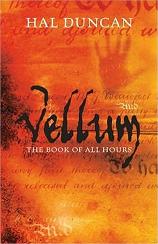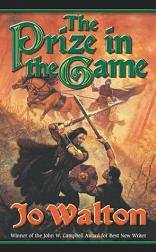Perhaps it should not come as a surprise that the author of Double Fold, which is all about how libraries are destroying their old newspaper archives in favour of far inferior microfilm collections, would be enthusiastic about
Wikipedia. Even better, as his article in The New York Review of Books shows, he has the correct attitude about noticability and deleting socalled non-noticable articles:
But the work that really drew me in was trying to save articles from deletion. This became my chosen mission. Here’s how it happened. I read a short article on a post-Beat poet and small-press editor named Richard Denner, who had been a student in Berkeley in the Sixties and then, after some lost years, had published many chapbooks on a hand press in the Pacific Northwest. The article was proposed for deletion by a user named PirateMink, who claimed that Denner wasn’t a notable figure, whatever that means. (There are quires, reams, bales of controversy over what constitutes notability in Wikipedia: nobody will ever sort it out.) Another user, Stormbay, agreed with PirateMink: no third-party sources, ergo not notable.
Denner was in serious trouble. I tried to make the article less deletable by incorporating a quote from an interview in the Berkeley Daily Planet– Denner told the reporter that in the Sixties he’d tried to be a street poet, “using magic markers to write on napkins at Cafe Med for espressos, on girls’ arms and feet.” (If an article bristles with some quotes from external sources these may, like the bushy hairs on a caterpillar, make it harder to kill.) And I voted “keep” on the deletion-discussion page, pointing out that many poets publish only chapbooks: “What harm does it do to anyone or anything to keep this entry?”
An administrator named Nakon–one of about a thousand peer-nominated volunteer administrators–took a minute to survey the two “delete” votes and my “keep” vote and then killed the article. Denner was gone. Startled, I began sampling the “AfDs” (the Articles for Deletion debate pages) and the even more urgent “speedy deletes” and “PRODs” (proposed deletes) for other items that seemed unjustifiably at risk; when they were, I tried to save them. Taekwang Industry–a South Korean textile company–was one. A user named Kusunose had “prodded” it–that is, put a red-edged banner at the top of the article proposing it for deletion within five days. I removed the banner, signaling that I disagreed, and I hastily spruced up the text, noting that the company made “Acelan” brand spandex, raincoats, umbrellas, sodium cyanide, and black abaya fabric. The article didn’t disappear: wow, did that feel good.
So I kept on going. I found press citations and argued for keeping the Jitterbug telephone, a large-keyed cell phone with a soft earpiece for elder callers; and Vladimir Narbut, a minor Russian Acmeist poet whose second book, Halleluia, was confiscated by the police; and Sara Mednick, a San Diego neuroscientist and author of Take a Nap! Change Your Life; and Pyro Boy, a minor celebrity who turns himself into a human firecracker on stage. I took up the cause of the Arifs, a Cyprio-Turkish crime family based in London (on LexisNexis I found that the Irish Daily Mirror called them “Britain’s No. 1 Crime Family”); and Card Football, a pokerlike football simulation game; and Paul Karason, a suspender-wearing guy whose face turned blue from drinking colloidal silver; and Jim Cara, a guitar restorer and modem-using music collaborationist who badly injured his head in a ski-flying competition; and writer Owen King, son of Stephen King; and Whitley Neill Gin, flavored with South African botanicals; and Whirled News Tonight, a Chicago improv troupe; and Michelle Leonard, a European songwriter, co-writer of a recent glam hit called “Love Songs (They Kill Me).”
All of these people and things had been deemed nonnotable by other editors, sometimes with unthinking harshness–the article on Michelle Leonard was said to contain “total lies.” (Wrongly–as another editor, Bondegezou, more familiar with European pop charts, pointed out.) When I managed to help save something I was quietly thrilled–I walked tall, like Henry Fonda in Twelve Angry Men.
It’s nice to for once see an article in the mainstream press that’s neither breathlessly boosterist nor arrogantly dismissive, but written by somebody who has actually gottne his feet wet, so to speak. Nicholson is very good in explaining what the appeal is of Wikipedia for both readers and editors. That on the one hand it’s a wonderful repository of useful and not so useful knowledge and on the other hand it’s a wonderful complex game of building that knowledge. On the gripping hand, it’s of course also an experiment in frustration if you get in too deep and get caught up in the behind the scenes politics of it all, as seen in the extract above.

